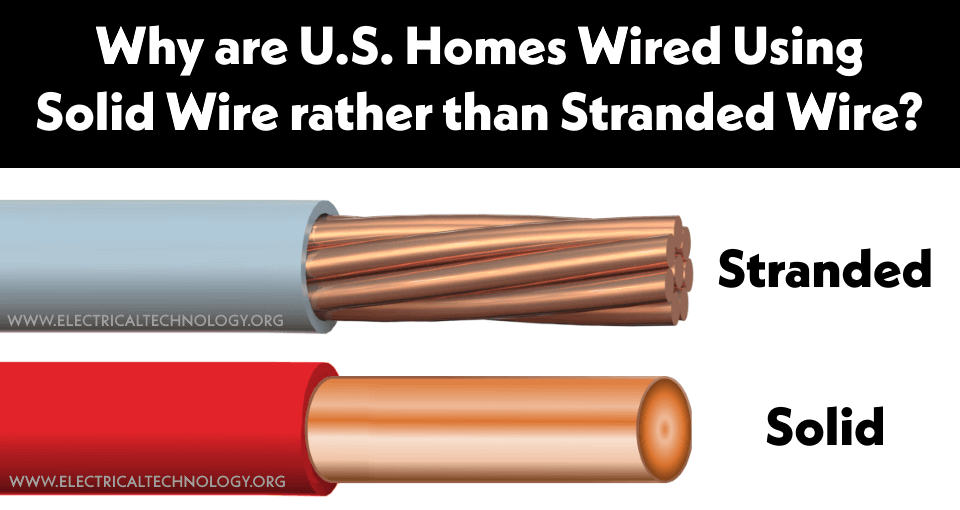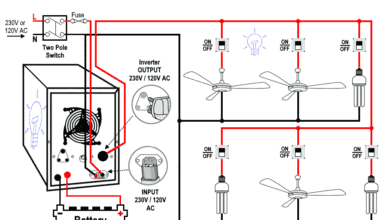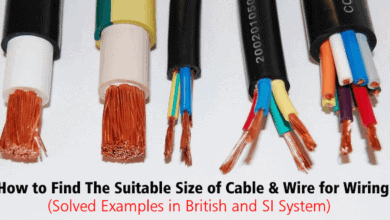Why are US Homes Wired Using Solid Wire rather than Stranded Wire?
Why Do the Electricians in the U.S.A opt-out for Solid Wire Instead of Stranded Wire While Doing Home Wiring?
In most of the countries in the EU, UK, South America and Africa and Asia, the electricians and homeowners use the stranded wire for home wiring instead of solid wire due to its long life flexibility including easy routing and bending. But the case is different in North America especially in the United States of America (U.S) as the solid wire is very common for home wiring such as 15A and 20A circuits for 120V and 240V supply voltage. Now, again to the question… Why? because the solid wire having the same size as a stranded wire carries more power at 60hz of frequency. Let’s see the other reasons as well as follows:
Related Posts:
- Stranded Wire vs Solid Wire. Which One is Best and Why?
- What are the Tiny Cylinder in Power Cords & Cable?
Why is Solid wire used in the U.S for home wiring while stranded wire is used in the rest of the world?
As we all know that one of the main advantages of stranded wire over solid wire is its flexibility, but the homeowners and electricians use the solid wire in home applications for single phase circuits due to the following reasons.
- Solid wire is cheaper as compared to stranded wire due to its complex process of production.
- Solid wire carries more power than stranded wire if the diameter of both wires are the same. In other words, for the same size, the ampacity or current carrying capacity of solid wire is more than the stranded wire.
- For the same wire gauge size (say 6 or 10 AWG), the cross sectional area of stranded wire is larger than the solid wire (due to the air-gap between the strands in it) and it make a noticeable difference in case of multiple wires in the electrical box or any other specific area.
- As mentioned above, the big advantage of stranded wire is its flexibility and they can be run / route and bend very smoothly, but in case of solid wires where they wire and place the wires permanently behind the walls, ceilings and floors. This way, it won’t make a difference if solid wire is used instead of stranded wire for home wiring.
- The termination and connections of breakers, switches, outlets etc. are perfect in case of solid wire while there may be complexity while connecting the stranded wires as there may be individual strands out of the screw terminals and loose connection when fold back the wires into/out of the box.
- In the case of solid wire, It is easy to splice together with a wire-nut. In addition, the solid wire won’t damage or wear/tear if you pull out tightly back to check the connection. And yes, life gets easy when you undo the wire nut connection for solid wire while in case of stranded wire, the strands of conductor may break when you undo a joint or open a wire nut.
- The skin effect in solid wire may be neglected in case of home wiring because the skin depth is 8.5mm (1/3″) in case of copper for 60hz of supply frequency. This way, it wont play a role if the diameter of the wire is more than 17mm (2/3″). In short, you may use stranded wire up to 6mm (10AWG) for enough flex if needed, other than solid wire is perfect.
- Solid wire is less likely to be affected by corrosion and vibration due to the less surface areas as compared to the stranded wire especially when used for outdoor applications.
These all are the specific reasons why electricians in the USA use a solid wire for basic circuits for home wiring instead of a stranded wire. If you (Master Electrician) know something other than the above reason, please share with us in the following comment box.
Related Posts:
- Types of Electrical Wires and Cables
- Why Coaxial Cables are Highly Insulated?
- How To Locate Faults In Cables? Cable Faults, Types & Causes
- Wire & Cable Size Calculator in AWG
- Electrical Wire & Cable Size Calculator (Copper & Aluminum)
- How to Find The Suitable Size of Cable & Wire for Electrical Wiring Installation? Examples in Imperial & Metric System
- Cable and Wire Tester Circuit Diagram
- ABYC Cable & Wire Color Codes for Yacht, Boat & Marine Wiring
- Treeing in XLPE Insulated Medium & High Voltage Cables
- MV & HV Cable Termination to Equipment & Joints
- Electric Stress Control in Cable, Joints & Terminations
- Cables Feeder Protection – Faults, Types, Causes & Differential Protection
- Submarine Cables – Construction, Characteristics, Cables Laying & Joints
- Choice of Wiring System – Types Of Cables Used In Internal Wiring
- Types of Control & Communication Cables








In Poland (which is in EU) solid wires are used most of the time. I have much smaller statistics in case of Germany, but there I have also seen only solid wires used.